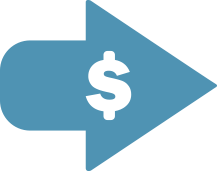- THE WORLD OF PRIVATE LOANS
- CREDIT
- MANAGING YOUR MONEY
- BORROWER BENEFITS
The World of Private Loans
Not all private student loans are created the same. Compare the details of different loan products to ensure you apply for the best loan for you.
Private Loans
Private student loans can play an important role in financing your education, but you want to apply for the one that is best for you. Look at how much a loan will cost you over time, as well as the options you'll have when it comes time for repayment.
Click on each term to learn more about the things to consider when choosing a private loan.
Interest rates can vary greatly, and can be influenced by your credit history. Lenders usually offer a choice between fixed interest rates (i.e., the interest rate never changes) or variable interest rates (i.e., interest rates may change over time). High interest rates cost more in the long run.
Some loans offer grace periods after graduation, during which no payments need to be made. Many loans offer options on how long you can take to repay the loan. A longer repayment period means lower monthly payments, but can cost you more interest.
There may be options for temporarily suspending loan payments, such as forbearances or deferments. These options provide a safety net in case you someday have trouble making payments.
Sometimes lenders will charge fees when you borrow money. When fees are high enough, they can offset the benefit of a low interest rate.
Student or Parent


Whether it's better for the student or the parent to borrow a private loan is a decision that needs to be based on your personal situation.

Keep in mind that most private student loans require a credit check, so parents with good credit may find it easier to get loans and may be offered lower interest rates than students with limited or no credit histories. On the other hand, students can often get private student loans if they have cosigners that agree to take on the responsibility of loan repayment in the event that the student doesn't make payments. Borrowing private student loans responsibly is one way for students to begin building their own solid credit histories.
Interest Rates
When banks lend you money, they also charge you interest, which begins to accumulate as soon as you receive the loan. When it's time to pay back a loan, you have to pay back the amount you borrowed plus interest.
Fixed or Variable?
Interest rates can be fixed at a specific rate for the entire life of a loan, or they can be variable. Some private student loans have variable rates, meaning the interest rates change at regular intervals (such as once a year). This means your interest rate, and therefore your monthly payment, may increase or decrease over the life of your loan.
If you get a loan with a variable interest rate, note how often the rate is reset, when it is reset, and whether or not it has a maximum limit. For some loans, the interest rates are reset quarterly, while others are reset annually. Tracking rate changes helps ensure you aren't surprised by higher interest or changing payment amounts.
Incentives
For private student loans, some lenders offer incentives such as a lower interest rate if you make a certain number of payments on time or pay via a certain method such as automatic withdrawals from a checking or savings account. Try to take advantage of such incentives if available.
Fees
In addition to the interest you are charged for a loan, lenders may also charge you various fees at different times. These fees should be taken into consideration along with the interest rate when determining the actual cost of a loan.
up-front fees

Up-front fees, such as origination fees, are charged immediately when the loan is made.
For example, say the lender charges a 1.5% origination fee. If you have a $10,000 loan, this 1.5% fee (equal to $150) is subtracted from the amount of the loan. This means you'll actually receive $9,850 but will have to repay the original $10,000 amount plus all accrued interest.
back-end fees

Back-end fees, such as repayment fees, are charged just prior to when you begin repayment.
For example, say the lender charges a 3% repayment fee. If you have a $10,000 loan, this 3% fee (equal to $300) is added to the principal balance of the loan before you begin repayment. This means you'll be repaying $10,300 plus all accrued interest.
Repayment Terms & Options
In addition to the basics of when repayment begins and how long it takes, there are some important repayment options to look for when considering a private loan. Not all lenders offer all of these options for private student loans, but when offered they can allow you some additional time to get on your feet after college or if you have trouble making ends meet.
A period of time after you leave school, often six months, during which you do not have to make any payments.
A period of time during which a lender allows you to temporarily suspend loan payments due to meeting certain eligibility requirements. For example, you may qualify for a deferment if you go back to school.
A period of time during which a lender allows you to temporarily suspend loan payments due to financial hardship.
A lower interest rate or other perks may be offered if you make a certain amount of payments on time. These can save you a lot of money!
The Choice is Yours
Can I apply for any private loan I want?
Please answer the question above before continuing.
